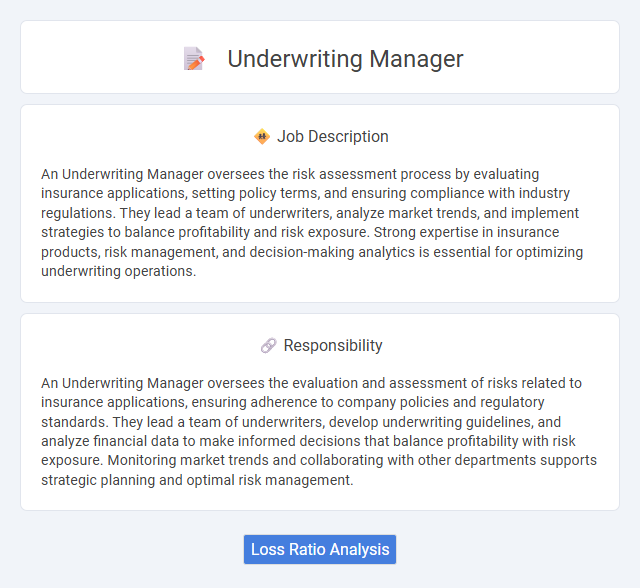
An Underwriting Manager oversees the risk assessment process by evaluating insurance applications, setting policy terms, and ensuring compliance with industry regulations. They lead a team of underwriters, analyze market trends, and implement strategies to balance profitability and risk exposure. Strong expertise in insurance products, risk management, and decision-making analytics is essential for optimizing underwriting operations.
Individuals with strong analytical skills and attention to detail are likely to be well-suited for the role of an Underwriting Manager, as the job requires thorough risk assessment and decision-making. Candidates who demonstrate effective communication abilities and leadership qualities may have a higher probability of managing underwriting teams successfully. Those who struggle with data interpretation or lack risk management knowledge might find this role challenging and may not align well with its demands.
Qualification
Underwriting Managers typically require a bachelor's degree in finance, economics, or business administration, with many employers preferring candidates with advanced certifications such as Chartered Property Casualty Underwriter (CPCU) or Associate in Commercial Underwriting (AU). Strong analytical skills, leadership experience, and a deep understanding of risk assessment and insurance regulations are essential. Proficiency in underwriting software and excellent communication skills to collaborate with agents and clients are also critical qualifications.
Responsibility
An Underwriting Manager oversees the evaluation and assessment of risks related to insurance applications, ensuring adherence to company policies and regulatory standards. They lead a team of underwriters, develop underwriting guidelines, and analyze financial data to make informed decisions that balance profitability with risk exposure. Monitoring market trends and collaborating with other departments supports strategic planning and optimal risk management.
Benefit
An Underwriting Manager likely oversees risk assessment processes to ensure profitable decision-making, which could lead to improved financial stability for the company. This role might offer substantial opportunities for leadership development and enhanced industry expertise. Employees in this position probably enjoy competitive compensation packages and the chance to influence key business strategies.
Challenge
Underwriting Manager roles likely present significant challenges in assessing complex risk profiles while ensuring profitability for the organization. Balancing thorough evaluation with efficient decision-making processes may require advanced analytical skills and strategic judgment. The necessity to adapt to evolving market conditions and regulatory changes probably demands continuous learning and agile management.
Career Advancement
Underwriting Managers play a critical role in assessing risk and making decisions that protect company assets and ensure profitability. Advancing in this career often involves developing expertise in risk analysis, leadership skills, and regulatory compliance, which can lead to senior managerial or executive positions within insurance firms. Mastery of data-driven decision-making and strong communication abilities further enhance opportunities for promotion and career growth.
Key Terms
Loss Ratio Analysis
An Underwriting Manager specializing in Loss Ratio Analysis evaluates insurance policy performance by examining claims data against earned premiums to ensure profitability and risk mitigation. They use statistical models and predictive analytics to identify trends and adjust underwriting guidelines accordingly, reducing exposure to high-risk policies. Their expertise in interpreting loss ratios drives strategic decisions that optimize underwriting portfolios and enhance overall financial stability.
 kuljobs.com
kuljobs.com